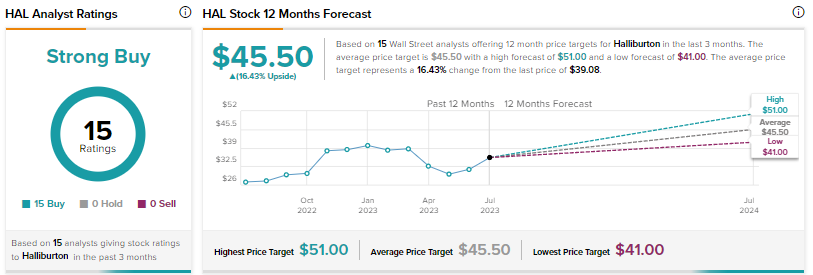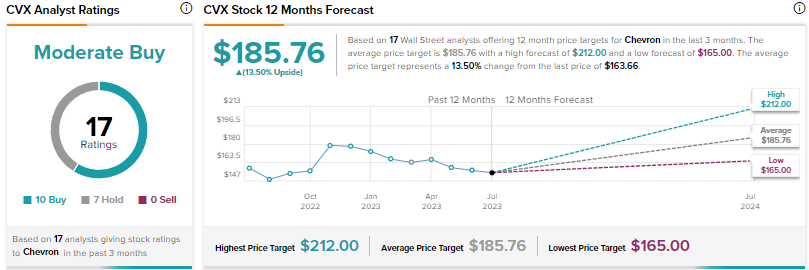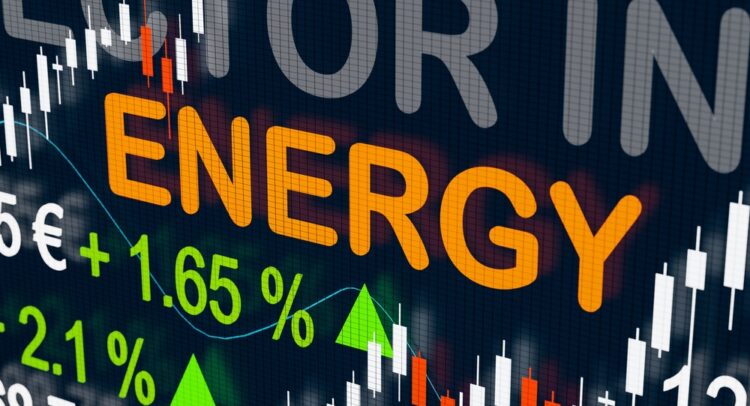Several oil and gas companies recently reported their second-quarter results. Earnings have moderated compared to the record levels seen last year, as energy prices have cooled down and fears around the supply of oil and gas have receded. Amid a volatile energy market backdrop, we used TipRanks’ Stock Comparison Tool to place Exxon Mobil (NYSE:XOM), Halliburton (NYSE:HAL), and Chevron (NYSE:CVX) against each other to pick the energy stock that scores Wall Street’s Strong Buy consensus rating.
Meet Your ETF AI Analyst
- Discover how TipRanks' ETF AI Analyst can help you make smarter investment decisions
- Explore ETFs TipRanks' users love and see what insights the ETF AI Analyst reveals about the ones you follow.

Exxon Mobil (NYSE:XOM)
In early July, Exxon cautioned investors about a decline in its Q2 profits due to lower natural gas prices. However, the company’s recently-reported earnings missed even the low estimates set by the analysts. Exxon’s adjusted EPS declined 53% year-over-year to $1.94 due to lower crude and natural gas prices and industry refining margins.
Nonetheless, the company is optimistic about the road ahead and is on track to reduce costs by $9 billion by the end of this year compared to 2019. Also, the company highlighted that production in Guyana and the Permian basis increased 20% year-over-year in Q2.
Moreover, Exxon is focused on expanding its Low Carbon Solutions business. It has signed a CO2 offtake agreement with Nucor (NUE), one of North America’s leading steel producers. Earlier this month, Exxon announced an agreement to buy Denbury for $4.9 billion, with the deal expected to add to the company’s portfolio the largest owned and operated network of CO2 pipelines in the U.S.
What is the Prediction for Exxon Stock?
In reaction to last week’s Q2 print, Raymond James analyst Justin Jenkins commented that while results were unimpressive on a relative basis, they reflected Exxon’s solid execution and improved unit-level profitability compared to prior cycles.
The analyst contends that keeping aside the “hiccup” in Q2 2023, the company’s solid operational performance has helped its balance sheet to return to better levels while boosting shareholder returns.
Wall Street’s Moderate Buy consensus rating on XOM stock is based on nine Buys and seven Holds. The average price target of $124.93 implies 16.5% upside.

Halliburton (NYSE:HAL)
Oilfield services company Halliburton reported better-than-anticipated earnings for the second quarter, with adjusted EPS rising 57% to $0.77. Revenue increased 14% to $5.8 billion, falling short of the analysts’ estimate of $5.85 billion. Investors were concerned about the sequential decline in the company’s North American revenue due to lower stimulation activity in U.S. land drilling.
The company generated free cash flow of $798 million and repurchased $248 million worth shares in the second quarter. It intends to return over 50% of its free cash flow to shareholders this year.
Halliburton also continues to strengthen its financial position and has retired $1.2 billion of debt in the last 18 months.
Is HAL a Good Stock to Buy Now?
Following the Q2 print, Goldman Sachs’ Neil Mehta increased his price target for HAL to $43 from $42 and maintained a Buy rating.
The analyst called Halliburton a compelling idea, citing its 50% international exposure and “high graded customer mix” in North America, which indicates a more balanced exposure to the oilfield.
Mehta believes that the rig count could remain flat from current levels through the rest of the year. He thinks that investors might be more willing to take a position in the shares at current levels to benefit from an “eventual inflection” in gas rig count in 2024.
Wall Street’s Strong Buy consensus rating for Halliburton is backed by 15 unanimous Buys. The average price target of $45.50 implies 16.4% upside.

Chevron (NYSE:CVX)
Chevron’s Q2 adjusted EPS fell to $3.08 from $5.82 in the prior-year quarter, reflecting lower upstream realizations and a decline in margins on refined product sales. That said, the company managed to surpass analysts’ adjusted EPS estimate of $2.92.
Despite near-term pressures, Chevron continues to make higher investments in the U.S. to support future growth. In May, the company announced an agreement to acquire PDC Energy for $6.3 billion. The acquisition is expected to boost Chevron’s proved reserves by 10% for under $7 per barrel of oil equivalent (BOE). Plus, it is projected to add $1 billion to annual free cash flow.
The company stated that it aims to grow its production by developing over 2,200 net new wells over the next five years, while delivering a return on capital employed of about 30% and free cash flow of more than $5 billion in 2027 at $60 Brent.
Is Chevron Stock a Buy or Hold?
On Monday, Goldman Sachs analyst Neil Mehta upgraded Chevron from Hold to Buy, with a price target of $187. The analyst cited the stock’s relative valuation, leading capital returns, and expected inflection in cash flow in 2024 and volumes in 2025 as the reasons for his bullish outlook.
Mehta believes that some of the timing and upstream risks have been abated, given recent project developments like the Tengiz key projects now at 98% completion, the rise in Permian volumes, and a closer timeline to some Gulf of Mexico projects coming online.
With 10 Buys and seven Holds, Chevron scores a Moderate Buy consensus rating. The average CVX stock price target of $185.76 indicates 13.5% upside potential.

Conclusion
Wall Street is highly bullish about Halliburton and cautiously optimistic about Exxon and Chevron. Including dividends, the expected total returns offered by Exxon are slightly higher than Halliburton. Nevertheless, the unanimous Buy ratings for Halliburton reflect analysts’ confidence in the oilfield services company’s ability to boost its performance in the years ahead.
As per TipRanks’ Smart Score System, HAL scores a “Perfect 10,” implying the stock has the ability to outperform broader market averages over the long term.
















